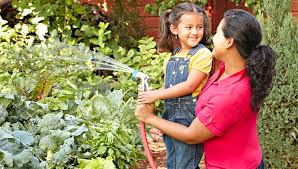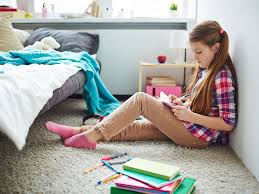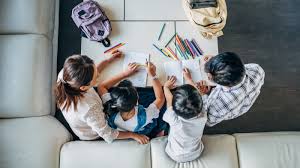In This Article
- Where to Begin
- Preschoolers (ages 2-4)
- Little Kids (ages 5-7)
- Big Kids (ages 8-10)
- Tweens and Teens (ages 11+)
When schools closed in March due to the spread of the novel coronavirus, most parents prayed it would be a short-term problem. But as more and more states have opted to close their schools’ doors through the rest of the school year, you’ve likely found yourself with more and more time to fill, and not all of this time can be spent watching YouTube videos or doing worksheets.
With that in mind, perhaps it’s time to turn your kids’ distance learning into something more relevant to the current climate we’re all living in. It’s a bad situation, but many of us can turn this dumpster fire of a school year into something moderately useful if we start thinking outside the box.
No matter how old your school-aged kids are, there are life skills that need to be taught! And now that your entire family is home 24/7, it might just be the perfect time to teach them. After all, you’re a Pandemic Parent now—time to start acting like one.
Where to Begin
In the words of Queen Elsa, Let. It. Go. School at home doesn’t need to look like a typical classroom, with everyone circled around the kitchen table raising their hands. Traditional schooling is designed to accommodate the needs of 25 kids at a time; your “classroom” probably only has two or three kids in it and can be much more flexible.
Plus, the experts are clear: kids learn best through play, exploration, and hands-on activities. That means they’ll benefit more from a third-grade math lesson that takes place in the kitchen, over a boxed mix of brownies, than one that happens in a textbook.
Now that you’re adjusting your own ideas about what learning means for your kids, it’s time to start thinking for real about the gaps in your kid’s life skills education. Do they know how to sort laundry? Chop an onion? Recycle cardboard boxes?
Sure, they’ll need to know these things eventually—but learning them now means that you can dovetail some of these street smarts with all the book smarts you’re teaching them, too.
Here’s a breakdown of some of the best life skills you can teach your kids during school closures by age group, along with suggestions for how you can tie many of them to academic life.
Preschoolers (ages 2-4)

Some of the life skills for this age group can be independent ones, but some will still require your assistance or supervision. It’s important to teach them anyway, though, so your kids can keep improving as they get older.
Cleaning Up After Themselves
Put your child’s sorting and identifying knowledge to work: ask them to put their toys in the appropriate bins after they’re done playing, sort their books by color on the shelf, or line up their stuffed animals on their bed by size.
Knowing Emergency Contact Info
Does your little one know their numbers? Teach them your home and/or cell phone numbers, as well as how to dial 911. Also see if they can memorize their street address, town, and state.
Picking Out Their Own Clothes
Only in the mind of a three-year-old do polka dots coordinate with plaids, but you need to pick your battles here—especially since learning how to get dressed appropriately involves checking the weather and talking about what the day’s activities will include, which is a great way to do a little a.m. circle time.
Setting the Table
Looking for an easy way to introduce numbers, counting, and symmetry? Look no further than a table setting, which offers a chance to lay out matching sets of silverware, plates, and cups along with spatial and procedural memorization.
Little Kids (ages 5-7)

This is the sweet spot for helpers at home because kids this age love to feel like they’re doing grown-up jobs and they can actually do stuff.
The trickiest part is figuring out when to step in and help, and when to step back and let kids problem-solve on their own. Unless they could create a potentially unsafe situation, err on the side of stepping back (you’ll be surprised at what they can handle).
Performing Basic Cleaning Tasks
On top of wiping down sinks and light vacuuming, ask your child to sort out the trash and recycling—learning which materials are recyclable leads to all kinds of good conversations about taking care of the environment and not producing too much waste.
Preparing and Sorting Laundry
Does your child know to separate light and dark colors? What about emptying out pockets before putting something in the washing machine? Do they understand why that one red sock will turn the whole load pink? This is Properties of Matter 101, people!
Making the Bed
This skill is often overlooked during the school-year rush to get out the door in the morning, but you have plenty of time on your hands now to teach your kid how to make their bed.
Knowing Beginner Cooking Skills
Stirring, mixing, shaking, whisking. All hugely popular with kids. Also popular? Cracking eggs, using the blender (with supervision), and making PB & J sandwiches.
Big Kids (ages 8-10)

Kids in this age group can manage most kid-friendly tasks, but it’s time to think beyond “Can my kid pour the right amount of kibble into the dog’s bowl?” and ask yourself if they can do it at the same time every day without being reminded.
They can also begin to take on some of the tasks you didn’t quite trust them with at six or seven—like cooking over a hot stove—as long as you feel they have good judgment and safety knowledge.
Mastering Intermediate Cooking
At this age, you can probably teach your kid to scramble eggs, boil water for pasta, and make pancakes. But you can also teach them fractions by setting out measuring cups and asking them to double, triple, or even quadruple an easy recipe.
Gardening
How much sunlight do tomato plants need to grow? What’s different about the soil in the front yard versus the back? And what are the creepy crawlies eating all the zucchini? Gardening is one of the single best ways to blend life skills with science.
Using Common Tools
Hammers, screwdrivers, wrenches, hand saws—most of these require physical coordination but also some element of math or physical science in the form of angles, force, momentum, and speed.
Loading the Dishwasher
Believe it or not, you need some spatial intelligence to be able to load a dishwasher so everything fits and actually gets cleaned. Tell your kids it’s just like playing Tetris.
Tweens and Teens (ages 11+)

Okay, time to break out the big guns. Tweens need to learn how to be responsible for their time, money, and personal hygiene; teens should be focusing on the life skills they will need to live independently one day, like balancing a bank account and performing basic household maintenance.
Managing Money
This is math, obviously—and while it’s important to teach your kids how not to overspend on their monthly income/allowance, they also need to know several other related skills.
This might be calculating interest payments on credit cards and loans, comparing prices and percentage discounts, balancing their saving/spending/donating accounts, and filing a tax return.
Learning Household Maintenance
Can your teen change a light bulb? Pump gas? Unclog a drain? Mow the lawn? If not, it’s time for them to learn. These are “soft skills,” but still much-needed ones that come with plenty of conversation.
Mastering Personal Responsibility
There’s a lot to unpack here, but it’s important for older kids to get comfortable making phone calls, setting up appointments, ordering food or meal planning for a crowd, and budgeting their own time.
In other words, stop hounding them to clean their room so they can go out with their friends; encourage them to set a weekend schedule that leaves time for both.
Managing Their Hygiene
If you’re still hounding your tweens and teens to shower regularly, use deodorant, and properly care for their skin, and everything ‘you know where’ it’s time for them to take charge of their hygiene. Let them choose their own products, decide when they want to shower (a.m. or p.m.), and maintain a haircut or style of choice. Giving them some autonomy here will go along way toward motivating them.
A Word From Bhadar
If it feels too overwhelming right now to start teaching your kids life skills, don’t feel bad. You don’t have to add more tasks to your daily schedule if you’ve got too much going on.
However, keep in mind that teaching your kids some of these skills now may free up your time later, so it might help to look at it as an investment. Putting the time and effort into teaching them today will help your kids become independent, saving you time and energy in the long run.















